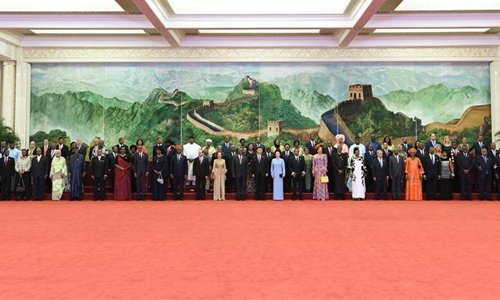
Chinese President Xi Jinping and his wife Peng Liyuan, together with foreign leaders and their spouses attending the Beijing Summit of the Forum on China-Africa Cooperation (FOCAC), pose for a group photo on Monday before a welcoming banquet held at the Great Hall of the People in Beijing. (Xinhua/Zhang Ling)
African entrepreneurs Tuesday hailed China's offer of $60 billion in financing for the development of the continent, saying they are expecting huge business opportunities in the future.
The entrepreneurs, who are attending the High-Level Dialogue between Chinese and African Leaders and Business Representatives in Beijing, also urged local governments in Africa to come up with measures to avoid bureaucracy and corruption from hindering future Chinese investments.
In his speech at the opening ceremony of the 2018 Beijing Summit of the Forum on China-Africa Cooperation (FOCAC) on Monday, Chinese President Xi Jinping announced that the country will extend a total of $60 billion in financing for Africa.
The financing will be provided in the form of government assistance as well as investment and financing by financial institutions and companies, Xi said.
Africa is rich in natural resources but lacks infrastructure to extract the resources, which comes at a price, said Andile Kenny Fihla, chief executive of Corporate and Investment Banking (CIB) of Standard Bank Group.
Without enough funding, it would be impossible to develop mines and extract oil and gases, Fihla told the Global Times on Tuesday.
Echoing Fihla, Alawi Shaaban Swabury, the founder and CEO of ESSB Swabury KG, a company that provides consultation services to investors in Asia, Europe and Africa, stressed that "without infrastructure, roads and electricity, Africa won't be industrialized.
In Africa, more than 600 million people have no access to electricity, 40 percent of the Chinese loans went to power generation and transmission, according to an opinion article published in the Washington Post in April.
Another 30 percent went to modernizing Africa's crumbling transport infrastructure, the article added.
"Aside from infrastructure, African countries, especially in less developed regions, also need financial support for education and training programs to help small firms gain global opportunities," said Gerhard Papanfus, chief executive of National Employers' Association of South Africa.
The support would help African countries develop skills, which is of great significance as every country needs to stand on their own feet in terms of development, Papanfus told the Global Times on Tuesday.
Not political game
While Africa entrepreneurs welcome the offer, economist Jeremy Stevens told CNN that many felt the $60 billion financing would not be "politically appropriate" because Africa is allegedly overloaded with Chinese debt.
"This is a complete misrepresentation of the situation," Fihla said.
"Much of the financing is directed to the private sector, so it cannot be concluded that the financing would worsen the debt of African countries as the projects remain to be identified," he stressed.
"It's not a political game and China has no such political intention," Olive Kigongo, a board member of the Uganda Investment Authority, told the Global Times on Tuesday.
Before offering the financing, Xi stressed that China will set no political preconditions and will not interfere in African countries' domestic and internal affairs.
China has grown from a less developed country to the second largest economy in the world. It has undergone the stage that African countries face now, and offering help when it has the capability to do so, Kigongo said.
"The financing would help reduce poverty and other problems in Africa, and we are grateful," she said.
Not free money
The $60 billion is not "free money" for African countries, said Swabury, adding that governments in Africa should offer more incentives to attract and facilitate Chinese investments, such as setting up "China windows" at administrative departments.
"Corruption and bureaucracy should not hinder Chinese investors, and good governance is needed," he said.
Papenfus suggested a supervision mechanism to oversee the use of the money. "Corruption should be avoided and China needs to be assured that the financing is not misused at the local level," he said.
The event was held in Beijing during the FOCAC summit. More than 1,000 African representatives from some 600 enterprises, business groups and research institutes attended the conference from Monday to Tuesday.
A total of 53 African countries which have diplomatic relations with China have sent representatives to the conference.
